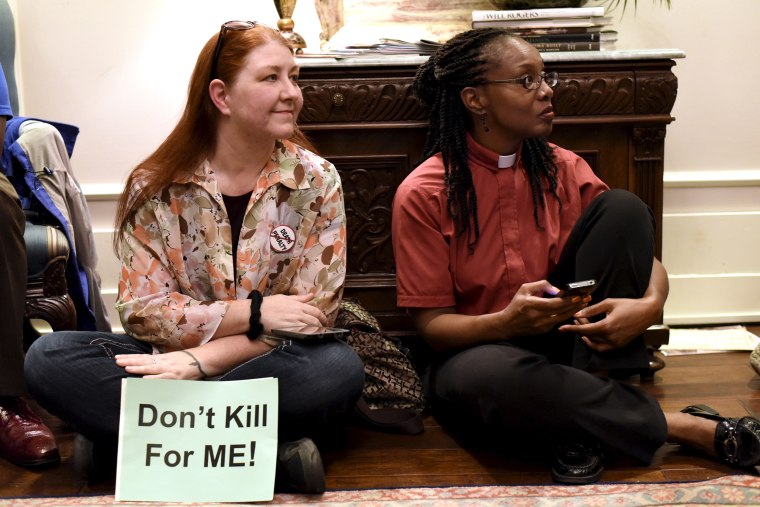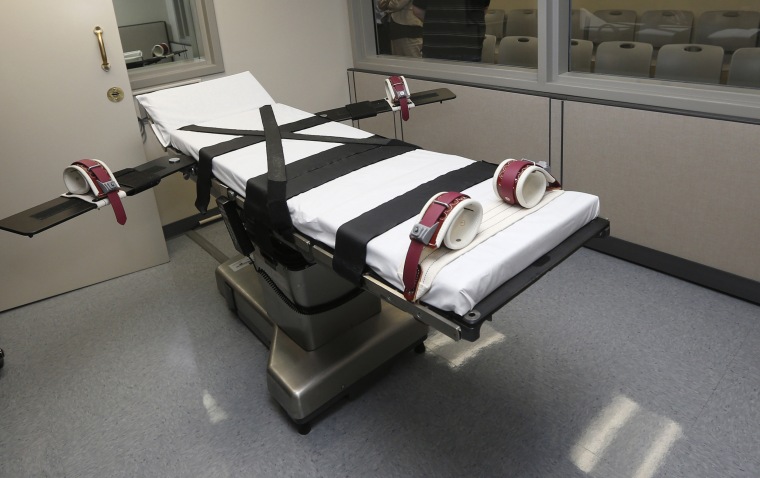In Oklahoma, a scandal over the state's execution methods has inspired a move to enshrine the death penalty in the state constitution.
In Nebraska, a governor unhappy with lawmakers' repeal of the death penalty has bankrolled a campaign to bring it back.
And in California, where condemned killers wait decades to meet their fates, residents will decide either to speed up the process or ban it entirely.
These three states sit at a crossroads in America's conflicted relationship with capital punishment, with voters set to determine next month whether the practice continues to fade away or stubbornly persists.
The ballot initiatives come at a critical time, as the death penalty appears to be slouching toward obsolescence.
Related: Supreme Court Considers Role of Race in Sentencing
Twenty states have abolished capital punishment, and another four have stopped the practice by decree of governors. The 15 people executed so far this year is the lowest number since 1991, according to the Death Penalty Information Center, a drop-off driven in part by shortages of execution drugs and successful challenges to capital sentences. National polls show that the public's support for the death penalty has been declining for decades, while opposition has grown.
But the number of Americans who approve of it still outnumber those who don't.
And in places where the death penalty has come under attack, proponents are seeking ways to keep it alive.
"What you have are attempts here not to mount any kind of revival of the death penalty, but to stop the bleeding," said Franklin Zimring, a criminologist at U.C. Berkeley School of Law.
None of this is surprising to Robert Dunham, executive director of the Death Penalty Information Center in Washington, D.C. When a social or government institution appears imperiled, it is natural for adherents to rally around it.
"The death penalty is eroding everywhere," Dunham said. "One by one, states are eliminating it, and even in states that keep it, prosecutors are seeking it less and juries are returning it less frequently. You can see the public support draining away. So for those with a vested interest in retaining the policy, they feel under siege. And they respond."
The revolt underway in Nebraska is in response to last year's move by the Republican-controlled state Legislature to repeal the death penalty on grounds it was costly, inefficient and wrong (the state hasn't executed anyone since 1997). Republican Gov. Pete Ricketts vetoed it, and the lawmakers overrode him.
Ricketts and his wealthy father then helped finance a campaign to take the issue directly to voters with a Nov. 8 referendum that asks whether the death penalty ban should be reversed.
Related: Ohio to Resume Lethal Injections After Three-Year Pause
"There’s a storm going on in Nebraska," Dunham said, part of the broader "political climate change" underway in regard to capital punishment.
The results will test whether America's slow turn against the death penalty can move into the country's deeply conservative areas.
Oklahoma is a different matter. It pursues the death penalty more aggressively than most states, with 112 executions in the last four decades, and another 47 people on death row. But a series of botched lethal injections forced Gov. Mary Fallin to issue a moratorium on executions until the state adopted new procedures.
Death penalty proponents responded by getting a referendum placed on the Nov. 8 ballot that seeks to add capital punishment to the state constitution. That would make it harder to repeal it, and would protect it from court rulings. But critics say the move subverts government checks and balances.
"The referendum in Oklahoma looks very much like a disproportionate response by individuals who feel as though the policy is under siege," Dunham said.

Then there's California, which has the largest number of people on death row (741), in large part because the appeals process is so burdensome. There have been no executions there in a decade, compared with 13 in the previous three decades.
California voters rejected an attempt to abolish the death penalty four years ago. But abolitionists believe they'll have better luck next month. They've gotten a question on the Nov. 8 ballot that asks whether the death penalty should be repealed.
But death penalty supporters, who acknowledge that the system is deeply flawed, back a second ballot question that asks to make the appeal process faster, a change that would speed the rate of executions.
If that measure passes, executions would begin again, and momentum could shift in favor of counter-repeal efforts elsewhere.
But if the repeal question wins, it will mark a huge leap toward ending the death penalty nationwide, said Douglas Berman, a law professor at The Ohio State University who specializes in criminal law and sentencing.
"If they do repeal, to me that will not only speed the path for politicians nationwide feeling comfortable with voicing their own repeal affinities, but will also embolden judges who, although they're not supposed to follow the election cycle, are shaped by a sense of which way the winds blow," Berman said.
Because the ballot questions are separate, both might pass. In that scenario, the one that received the most yes votes would prevail.
Barring a comprehensive ruling from the U.S. Supreme Court, Berman said, the death penalty will probably never disappear in America.
That's because, between the stalwart proponents and abolitionists, a sizable proportion of people understand the death penalty's shortcomings but don't want to preclude using it in the most heinous crimes, Berman said.
He predicted that use of the death penalty will diminish to the point where it's applied in those narrowest of circumstances.
Robert Blecker agrees. He's a professor at New York Law School and author of "The Death of Punishment: Searching for Justice Among the Worst of the Worst." Support for the death penalty, he said, is rooted in a "deeply felt moral intuition" that particularly horrific crimes should be punished with death.
"There are those of us who will stay angry and morally focused and care about justice," he said. "We will not be argued out of it on the basis of cost and inefficiency."

